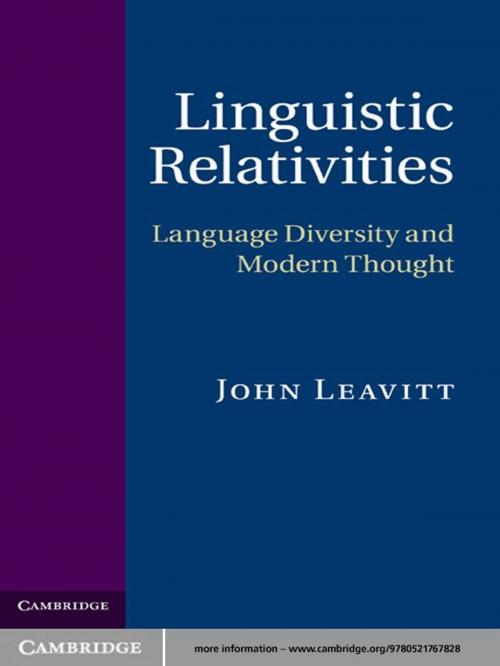Linguistic Relativities
Language Diversity and Modern Thought
Nonfiction, Reference & Language, Language Arts, Linguistics, Social & Cultural Studies, Social Science| Author: | John Leavitt | ISBN: | 9780511993916 |
| Publisher: | Cambridge University Press | Publication: | December 23, 2010 |
| Imprint: | Cambridge University Press | Language: | English |
| Author: | John Leavitt |
| ISBN: | 9780511993916 |
| Publisher: | Cambridge University Press |
| Publication: | December 23, 2010 |
| Imprint: | Cambridge University Press |
| Language: | English |
There are more than six thousand human languages, each one unique. For the last five hundred years, people have argued about how important language differences are. This book traces that history and shows how language differences have generally been treated either as of no importance or as all-important, depending on broader approaches taken to human life and knowledge. It was only in the twentieth century, in the work of Franz Boas and his students, that an attempt was made to engage seriously with the reality of language specificities. Since the 1950s, this work has been largely presented as yet another claim that language differences are all-important by cognitive scientists and philosophers who believe that such differences are of no importance. This book seeks to correct this misrepresentation and point to the new directions taken by the Boasians, directions now being recovered in the most recent work in psychology and linguistics.
There are more than six thousand human languages, each one unique. For the last five hundred years, people have argued about how important language differences are. This book traces that history and shows how language differences have generally been treated either as of no importance or as all-important, depending on broader approaches taken to human life and knowledge. It was only in the twentieth century, in the work of Franz Boas and his students, that an attempt was made to engage seriously with the reality of language specificities. Since the 1950s, this work has been largely presented as yet another claim that language differences are all-important by cognitive scientists and philosophers who believe that such differences are of no importance. This book seeks to correct this misrepresentation and point to the new directions taken by the Boasians, directions now being recovered in the most recent work in psychology and linguistics.















